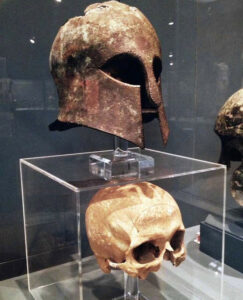Unearthing Ancient Greek History

In 1834, on the historic Plain of Marathon, a remarkable discovery was made – a Corinthian helmet, possibly worn by a Greek warrior during one of the most pivotal battles in ancient history. This artifact, now housed in the Royal Ontario Museum (ROM), offers a tangible link to the heroic age of Ancient Greece and the legendary Battle of Marathon in 490 BC.
The Discovery and Its Journey

The helmet’s journey from battlefield to museum is a tale of intrigue. Excavated by George Nugent-Grenville, 2nd Baron Nugent of Carlanstown, it was passed down through generations before being acquired by the ROM in 1926. Remarkably, the helmet was said to contain a skull, adding an air of mystery to its provenance.
A Window into Ancient Warfare

The Corinthian helmet, with its distinctive design, has become an iconic symbol of Ancient Greek warriors. This particular specimen provides invaluable insights into the construction techniques and materials used in ancient armor. Its varying thickness – from 2-3 mm on the face to less than 1 mm on the back and crown – reflects the strategic design tailored for the hoplite warfare of the time.
Mysteries and Uncertainties

While the helmet’s connection to the Battle of Marathon is tantalizing, many questions remain. The presence of the skull within the helmet poses a puzzle, as victorious Greeks would not have left equipment or remains on the battlefield. The exact relationship between the helmet and the skull, and their definitive link to the famous battle, remain subjects of scholarly debate.

Bridging Past and Present

This Corinthian helmet stands as a testament to the enduring fascination with Ancient Greek history. It not only provides valuable information for historians and archaeologists but also inspires modern craftsmen seeking to recreate authentic replicas. As research continues, this artifact from Marathon continues to bridge the gap between our world and the heroic age of Ancient Greece, inviting us to ponder the lives and battles of those who shaped Western civilization.

